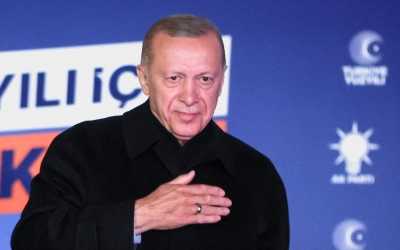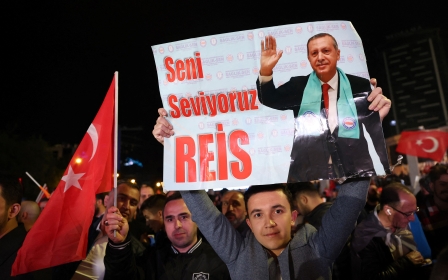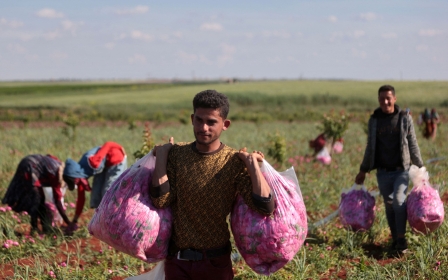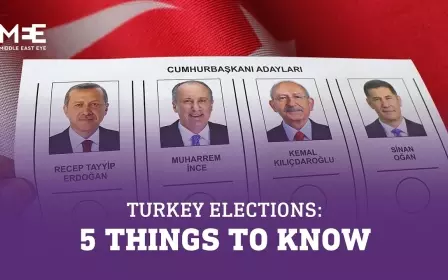Sinan Ogan: The anti-refugee ultra-nationalist shaking up Turkey's election
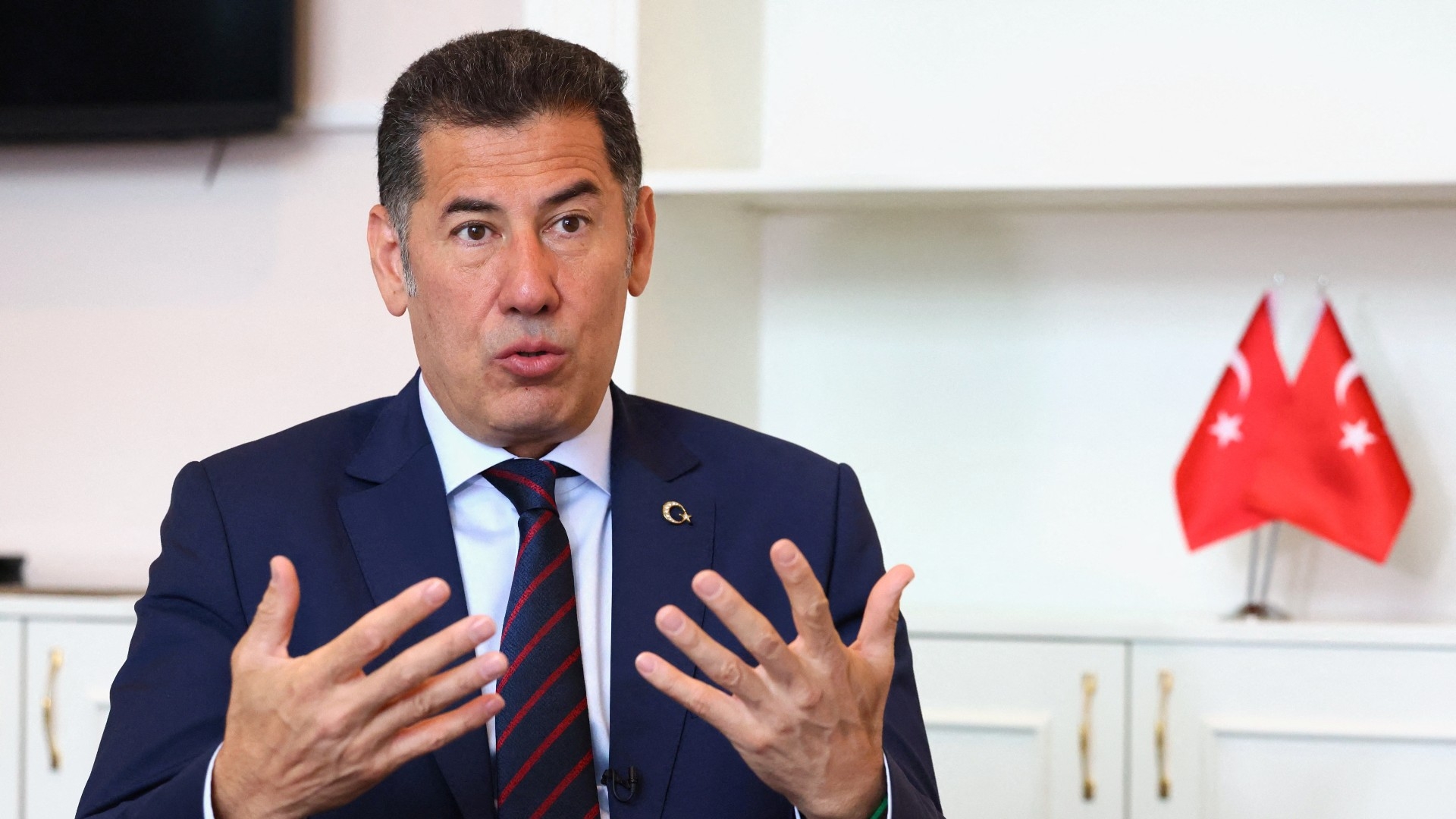
It’s safe to say one man truly outperformed expectations in Turkey’s presidential vote on Sunday: Sinan Ogan.
The ultranationalist candidate of the Ancestral Alliance, which is a combination of the Victory Party and Justice Party, Ogan got 5.2 percent of the vote, forcing the race into a second round runoff between President Recep Tayyip Erdogan and Kemal Kilicdaroglu on 28 May.
Most polls before the election indicated he’d struggle to surpass three percent.
After the election, results clearly demonstrated that there was no winner in the first round, Ogan confidently said the Nation Alliance opposition coalition “doesn’t know right-wing politics. That’s why they have lost many elections”.
It’s likely that Ogan was assisted by the withdrawal of Muharrem Ince, the Homeland Party candidate that quit over an online smear campaign. He also seems to have attracted conservative and nationalist voters turned off by the main candidates.
New MEE newsletter: Jerusalem Dispatch
Sign up to get the latest insights and analysis on Israel-Palestine, alongside Turkey Unpacked and other MEE newsletters
Middle East Eye's analysis of preliminary results suggests that Ogan clawed votes away from Erdogan in his strongholds and from Kilicdaroglu voters in opposition strongholds.
Some are calling Ogan the kingmaker. That might not be quite right. It’s unclear that his voters would head one way or another according to his wishes, but that 5.2 percent will decide the race nonetheless.
A former member of the Erdogan-allied Nationalist Movement Party (MHP), Ogan was born in the city of Igdir to an Azerbaijani family in 1967.
He received his PhD from Moscow State University, is fluent in Russian and English, and he has worked in several universities in Turkey and Azerbaijan.
Also, he was the representative of Turkish Cooperation and Coordination Agency (TIKA) in Baku, where he was honoured by the president, Ilham Aliyev, with a state medal. In his academic work, Ogan has extensively covered Turkey’s relations with Russia and former Soviet Union countries.
A third way
Ogan’s political career in the MHP ended in 2017 after he refused to support a referendum that would the following year change Turkey’s parliamentary system to the presidential one it has today.
He was able to enter the presidential race after managing to collect the required 100,000 signatures to be nominated, and was backed by far-right leader Umit Ozdag, a well-known figure for his anti-refugee remarks.
Ogan has largely built his presidential campaign on the promises of sending refugees back to their countries and aggressively pursuing “terrorists”. Painting himself as a third way for Turkish nationalists, he made a big deal of security in his campaign.
For instance, he claimed that Syrians were posing a national security threat in cities along Turkey’s border with Syria, complaining that in some areas they outnumber Turkish citizens. There are around 3.7 million Syrian refugees in Turkey, an increasingly controversial issue domestically.
'The undeclared CHP-YSP alliance irked some voters. Also, the anti-refugee sentiment has a platform for itself, now'
- Yunus Kaya, Istanbul University
Ogan also heavily criticised both the opposition and the government for their alliances with pro-Kurdish parties, claiming they were a threat to Turkey’s unitarian structure, which encourages political and ethnic centralisation.
The election results indicate that his anti-refugee sentiment and emphasis on Turkey’s unitarian structure resonated with voters.
“Ogan received the protest votes from different segments of the society,” Yunus Kaya, a professor at Istanbul University, told Middle East Eye. That included, Kaya said, nationalists and seculars who were disappointed with the tacit alliance between Kilicdaroglu’s Republican People’s Party (CHP) and the pro-Kurdish YSP.
Rhetoric hostile to refugees and the PKK, a Kurdish armed group associated by some with the YSP and its forebear the HDP, played a significant role in luring voters’ attention, according to Kaya.
“The undeclared CHP-YSP alliance irked some voters. Also, the anti-refugee sentiment has a platform for itself, now,” he said.
“Yet, it is early to conclude that Ogan and his political backers would herald the rise of a European-like far-right political wing.”
Courting Ogan
The second round of the presidential elections is expected to be tight, too. People are now eyeing where Ogan’s votes may go, and who he may endorse.
Ogan has said his support has four red lines.
First of all, the first four articles of the constitution must remain untouched. These articles are considered foundational, stating that Turkey is a secular, democratic and unitary nation state with one official language: Turkish.
Second, refugees will be sent back to their countries. Third, economic policies must be changed. Fourth, the fight against terror groups must continue.
On the face of it, these are demands that can be met by both Erdogan and Kilicdaroglu.
However, “he can’t bring his five percent together with him to one of these candidates as a whole”, Kaya said.
“The political parties that back him received less than 2.5 percent. It means that Ogan lured protest votes from independently acting voters.”
“Rather, his votes in Erdogan-dominated cities would go to Erdogan and in Kilicdaroglu-dominated cities would go to Kilicdaroglu,” Kaya added.
Ogan told Reuters that he would support Kilicdaroglu “in the runoff if he agrees to offer no concessions to a pro-Kurdish party”.
Yet, distancing himself from the Kurdish vote would be disastrous for Kilicdaroglu, who won heavily in Kurdish-dominated cities.
Both Kilicdaroglu and the AKP’s Binali Yildirim were reported to have held a phone call with Ogan last night. The courtship may have already begun.
This article is available in French on Middle East Eye French edition.
Middle East Eye delivers independent and unrivalled coverage and analysis of the Middle East, North Africa and beyond. To learn more about republishing this content and the associated fees, please fill out this form. More about MEE can be found here.


